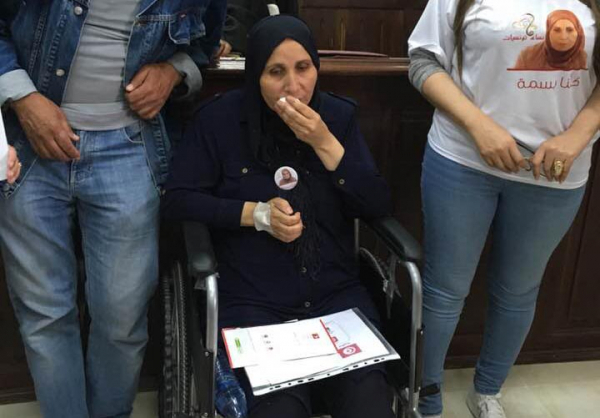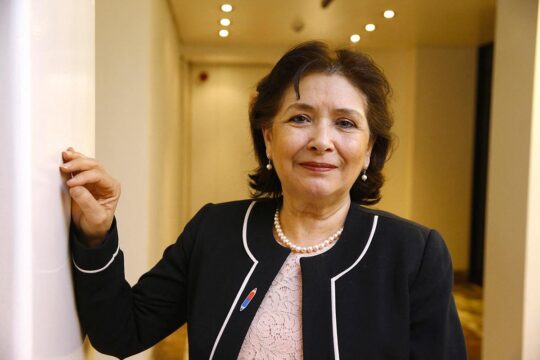“Madame Judge, I would like to continue my testimony, because I am not sure that at the next hearing I will still be alive,” said Bessma Baliî after an hour of testimony in a packed courtroom filled almost entirely with lawyers, activists and associations close to the Islamist Ennahdha movement, which chartered a bus from Tunis.
Bessma Baliî had been recounting in an almost inaudible voice the abuses she suffered for two months in a location of the Tunisian security services in Nabeul in autumn 1991. “I would never have believed that Tunisians could be so cruel,” she exclaimed between her tears.
She has become weaker and thinner since testifying in November 2016 before thousands of TV viewers at public hearings of the Truth and Dignity Commission, and came to court in a wheelchair. In recent months, this key witness to grave human rights abuses under Ben Ali has been suffering from a serious illness. She is not only a victim of torture, sexual and psychological harassment, whose family also suffered police persecution and humiliation, but she is also a key witness to murders of Islamist militants in the early 1990s.
The hell that was her captivity
At that time the Ben Ali regime was conducting a big wave of arrests of opponents, especially members of Ennahdha like Bessma Baliî. She was 26 at the time, from a large, poor, conservative Muslim family, and was an activist in her home village of Menzel Bouzelfa (60 km northeast of Tunis) in the movement’s social and charity wing. The clampdown on Islamists forced her to flee to refuge in the capital with people close to her. But members of the Nabeul National Guard special brigades led by Abdelfettah Ladib went after her, kidnapping her younger sister and forcing her sister to lead them to her. There was, however, never any arrest warrant against either of the girls.
“On the way back to Nabeul, they stuffed us both into a car full of police,” she told the court. “They subjected us to sexual harassment, felt us up and threatened to rape us. My sister was terrorized and could not stop crying. I will never forget the look on her face.”
But the worst was to come. Bessma Baliî’s real torture began as soon as she got to the police post. She was tortured both physically and mentally. For ten days she had to listen to the screams and pleading of her little sister who was being tortured in the next cell. She was beaten, insulted, sexually harassed and at night subjected to sexual touching up. “I wanted to die,” she says, “or at least to pass out.”
Rape and murder
She was also forced to watch naked men being tortured and sexual violence being performed on other women, wives of prisoners being used to track down or get confessions from their husbands. Reduced to a form of slavery, she was made to wash prisoners’ blood-soaked clothing and wash blood from the floor. In October 1991, she was witness to torture of Rachid Chamakhi, “who was exhibited in the corridors naked, handcuffed and bloodied to terrify the other prisoners” and of Fayçal Baraket, who both died under torture within a few days in the same police post at the hands of the same perpetrators, the same ones who treated Bessma Baliî and her sister with such cruelty.
Her sister was freed after 10 days, but Bessma’s torture continued until she was brought before judicial authorities and charged with belonging to a non-recognized party and distributing flyers. “If I am now sick it is because of all that I and my family went through and because of everything thousands of women suffered in their bodies and minds,” she moaned in court.
Weak logistics and absent suspects
Bessma Baliî has the strength and courage to be present, but her torturers – about 10 men who are still mostly alive and whose names and positions she has given – are not. They have stayed away from the trial, as in other recent cases concerning Chammakhi and Baraket.
Lawyer and Islamist parliamentarian Samir Dilou, who was also minister of human rights and transitional justice under the Troika (December 2011- January 2014) called for something to be done about this. “Madam President, with the start of trials in the specialized chambers, jurisprudence is being created. I therefore urge you to take preventive measures against the accused to ensure that impunity does not continue,” he said. “Make sure that there are bans on them leaving the country and summons orders are issued for them.”
Then it was the turn of lawyers for the civil parties and representative of the Association of Tunisian Magistrates (AMT) to complain, about the lack of logistics, a microphone, suitable sound system, screen and recording to document these historic trials of grave human rights abuses. “If the accused are absent, I am almost the only one to hear Bessma because I am right behind her and the people at the back can hear none of her testimony, and there is no recording, what is this trial for?” asks Samir Dilou.
Despite the court president’s visible sympathy for the former victim, she decided to suspend and then postpone the hearings until October 5, at the request of the lawyers who asked for it to continue “at a later date, but sooner rather than later given the critical state of Bessma Baliî’s health.”






